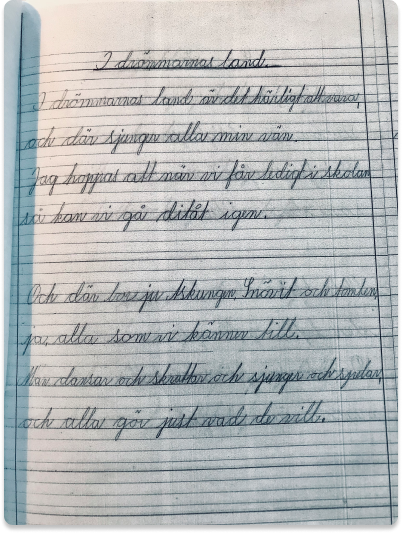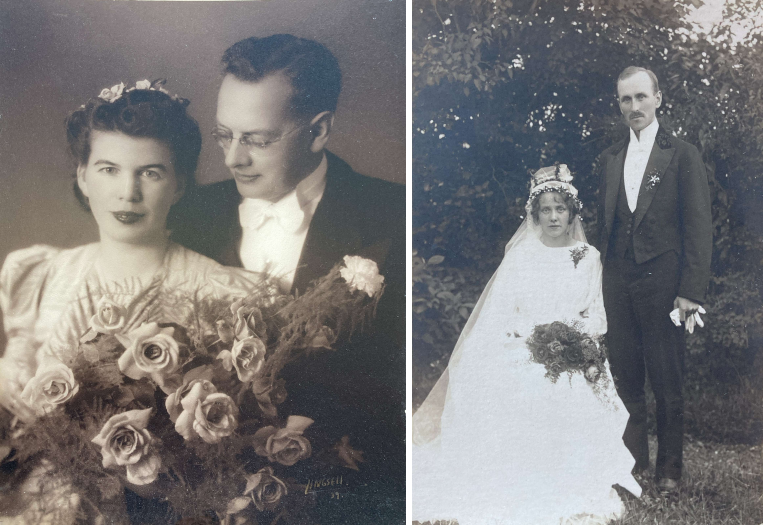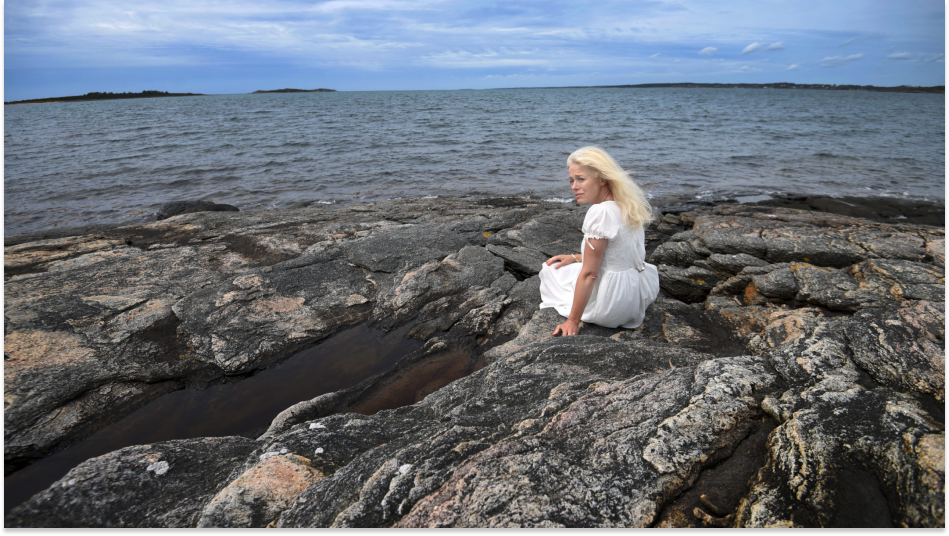About me
I was born in Uppsala, a town famous for its university and its cathedral, both being among the oldest of its kind in the world. It was a freezing cold day in November and so my father drove his old Volkswagen back and forth in front of the hospital in order to get it warm before my mother and I were to be driven home. Maybe that is the reason why I have always been fond of November.
My parents were teachers and interested in literature and we lived in a flat with many bookshelves. Both my parents had studied English and so many Anglo-Saxon writers were present. Good night stories, sometimes in the middle of the day, Christie and Shakespeare, were part of life. I remember how Mio min Mio (Mio, my Mio) written by Swedish children’s book author Astrid Lindgren was a crucial experience for me but I really read everything I could get a hand on, my parents’ old books from their youth, the classics, grandmother’s women’s magazines and grandfather’s evening papers. There was never a distinction between good and bad literature. Reading was reading and all reading was good.

I was lucky enough to have all four of my grandparents living in Uppsala during my youth. They had moved there after retirement from the north and south of Sweden and I met them every week. They were interested in me and told me a lot about their own lives, which I found fascinating. My father’s parents were Baptists while my mother’s parents were close to atheists and the difference between my pious father’s mother and my flamboyant mother’s mother was huge on the surface. But they were both gifted working women, my father’s mother being a teacher in German and French and my mother’s mother a hairdresser owning her own ladies’ hair salon, and they liked each other a lot. My father’s father, headmaster, writer, local politician, was constantly fighting for humanity and the dignity of each human being, not least during the Second World War. He has always been a strong role model for me. As has my mother’s father, a foster child who started his working life as a brakeman on the trains of northern Sweden and ended up as a clerk at SJ, the Swedish Railways. I am grateful for them sharing their stories with me.

In school, Swedish and foreign languages came easy to me but I also liked the natural sciences. Being torn between these two, I ended up in Journalism School in the Swedish town of Gothenburg and then worked for daily paper VLT in Västerås before fulfilling my dream of studying abroad. It was not to be New York or San Francisco but University of Kansas in Lawrence, in the heart of the Bible Belt and maybe not as spectacular as the East or West coast of the USA but because of that still very exciting. I left Kansas with a Master of Arts in political sciences, focusing on international relations, as well as the German student whom I married a couple of years after that.

We moved to Frankfurt, Germany, and I started freelancing and was the German correspondent of Swedish business magazine Veckans affärer for almost twelve years. We had just about arrived when those historic events took place that in the end resulted in the German reunification. I remember the first time I visited East Germany, the driver taking down his taxi sign before we crossed the border, soldiers controlling me, interviews under supervision, the impossibility to make a phone call. A couple of months later we celebrated a united Germany. The impossible had become possible.
Twelve years later we moved to Sweden, now with two children, a boy and a girl. I kept on freelancing while at the same time resuming an old interest in singing, music and dancing, resulting in me attending a musical education where I was twice the age of the others. One day I was working on an article about genetics after having rehearsed my role as the conferencier in Cabaret. That night I then saw one of Woody Allen’s movies, a parody on Swedish film master Ingmar Bergman’s Det sjunde inseglet (The Seventh Seal). My impressions got mixed up and that ”something” happened that happens when a story is born and there it was, the idea leading up to my first novel, Caipirinha med döden (Caipirinha With Death). Two years after that I was a full time author. The result is quite a large number of books currently published in eleven countries and I have also had the honour of receiving a number of prizes and nominations.
I live in Stockholm but spend much time in Frillesås, a small village on the Swedish West Coast. My father’s parents bought the summer place in the fifties and I have dwelled there since my childhood. The time I have spent in Frillesås has shaped me in many ways, which you will recognize in my literary universe. My summer friends still around, being close to the sea, running in and out of the neighbouring houses, old and young having fun together. Out on the islands, high up on a cliff with a view of the arkipelago, I feel as free as is possible for me. Busters öron (Buster’s Ears) was the first of my books set in Frillesås. More were to follow.

After many years of sickness my father died a couple of years ago, at the age of 77. Seeing my kind, healthy and youthful father break down was difficult. He was a modern man for his time and very proud of his daughters, me and my sister. I miss him deeply, but it is true what Swedish author and poet Harry Martinson writes, that sorrow is the greatest honour that joy can be rewarded. And I laughed a lot with my father. Alltid hos dig (Always with you) is written after his death and dedicated to him.
My years as an author has taken me to places where I would not have visited otherwise. I have held lectures in bookstores, libraries, schools and even in jail. I also spent a month in a French abby, resulting in Innanför murarna (Within the Walls) and French documentary Résidence(s).
Everything I have seen, heard, been taught, have thought, finds its way into my books. I am there even if ”I” am not. No man is an island and free from their history, relatives or friends. Nobody can tell from where the story comes, where it started and when it ends. It continues to live in various forms, in the end in the hearts and minds of everyone reading or listening.
After all these years I know that inspiration is not what is most important. Instead, it is discipline. Sitting down even when not feeling like it. Listening to the right persons. Me being brave enough to believe in my idea and my novel or short story. It is crucial not to forget that original feeling, the one which made me write my first book, putting to words that very first sentence. My desire to tell a story.